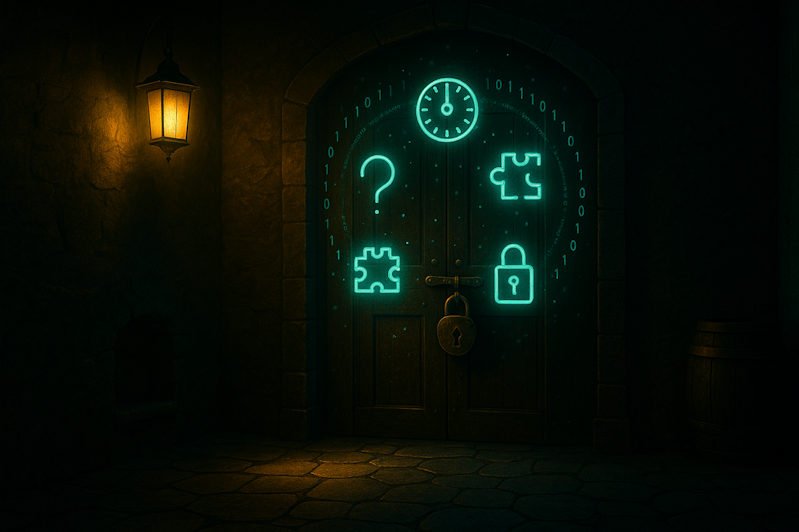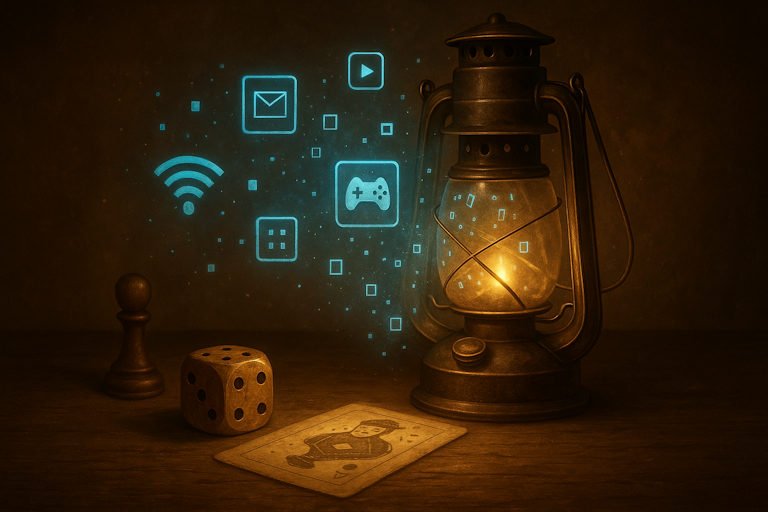
Online escape games: The astonishing
rise and lasting impact (2025)
Online escape games have unlocked a whole new way of playing together. What started as a clever alternative to physical rooms has grown into a world of its own. Instead of gathering around a single table or being locked inside four walls, players now connect through screens — solving puzzles, cracking codes, and chasing mysteries from wherever they are.
The appeal goes beyond convenience. Online escape games bring together teamwork, surprise, and story-driven tension in a format that fits modern life. Whether you’re joining friends across cities or simply craving a quick dose of mystery after work, these digital adventures offer a doorway into play that feels both fresh and familiar. In this article, we’ll explore how the rise of online escape games reshaped our sense of connection — and why their impact may be here to stay.
The rise of online escape games
Escape games have always thrived on one essential promise: stepping into a puzzle-filled world where every clue brings you closer to freedom. Long before the digital shift, physical escape rooms were booming across cities — dark chambers with hidden codes, locks, and frantic countdown clocks. But when gathering in person became difficult, players sought new doors to unlock. Out of that moment, online escape games emerged, and the format never looked back.
The first wave was practical. Developers translated the concept of escape rooms into browser-based puzzles, interactive PDFs, and livestreamed adventures. Teams would log in, share screens, and race the clock together. Instead of turning a physical key, players pieced together digital documents, cracked visual riddles, or searched websites filled with hidden layers. The goal remained the same: find the path out. The medium had changed, but the thrill of discovery was intact.
Accessibility made this rise unstoppable. All you needed was a laptop and an internet connection. No travel, no elaborate setups — just click a link and step into a mystery. This opened the door to audiences who had never set foot in a physical escape room before. Suddenly, friends in different cities could play together as if they were in the same chamber. The sense of being “locked in” was replaced with a new kind of immersion: you weren’t physically trapped, but mentally pulled into a web of clues.
At the same time, creators realized online escape games could go further than physical walls allowed. Digital rooms could shift in real time, reveal impossible illusions, or send players across virtual maps without the limits of space or props. Where physical escape rooms relied on locks and props, online games could weave in video, soundscapes, and branching storylines. This freedom expanded the genre beyond its origins — making the online format not just a substitute, but a frontier in its own right.
Discover
the Firefly Inn
Behind its lantern light, mysteries unfold.
Step inside and choose your path

Why people keep playing online escape games
Once the novelty of a new format fades, only strong design and real connection can keep players coming back. Online escape games have managed exactly that. Their popularity is not just a product of circumstance — it is rooted in the unique mix of accessibility, teamwork, and immersive storytelling that makes the experience memorable.
For many adults, the biggest draw is social. Online escape games allow friends, colleagues, or families spread across different places to share the same challenge. With just a video call and a game code, a group can slip into a shared mystery. Instead of passively watching a screen together, players actively interact, exchange ideas, and test each other’s logic. The dynamic feels close to gathering around a table, but without the travel or scheduling headaches.
Another reason for their staying power lies in flexibility. Physical escape rooms require space, props, and staff. Online escape games, by contrast, scale easily. You can play in teams of two or six, or even explore solo if you prefer a quiet puzzle session. A single license or ticket often covers the whole group, making the experience cost-effective compared to traditional outings. This affordability lowers the barrier for people who want to try an escape adventure without committing to a full night out.
But what truly keeps players engaged is immersion. Developers of online escape games have learned to create rich, layered worlds that go beyond locks and keys. Digital interfaces can shift in ways physical walls never could: hidden links, changing websites, cryptic audio files, or video sequences that react to your choices. Each clue feels like a secret waiting to be uncovered, and each solved puzzle unlocks a fresh layer of story.
The blend of mystery, teamwork, and creativity explains why people keep returning. Online escape games are not simply digital puzzles; they are shared journeys that spark laughter, tension, and moments of triumph. And those feelings — the mix of suspense and relief when the final code clicks into place — are what make the format more than just a passing trend.
Discover
the Firefly Inn
Behind its lantern light, mysteries unfold.
Step inside and choose your path

Key benefits of online escape games
The popularity of online escape games is not just about novelty — it comes from the concrete advantages they offer. Players quickly discovered that digital mysteries could be easier to access, cheaper to join, and in some ways even more immersive than their physical counterparts. Below are some of the key benefits that explain why this format continues to thrive:

- Accessible from anywhere: With nothing more than a laptop and an internet connection, you can step into an escape game from your living room, office, or even while traveling. This makes them one of the most flexible forms of play.
- Affordable for groups: Unlike traditional escape rooms where every player buys a ticket, most online escape games use a single license for the whole team. It keeps costs low while still delivering a shared adventure.
- Flexible in size: Whether you want to puzzle alone after a long day or gather a group of six friends, online escape games adjust to your needs. No host or props are required — just log in and start.
- Social and interactive: Instead of passively streaming content, players engage in live teamwork. Sharing clues and debating codes over a call creates the same tension and laughter you’d find around a real table.
- Immersive design: Digital rooms can transform in ways physical ones never could. Expect cryptic audio files, shifting websites, and cinematic cutscenes that pull you deeper into the story.
Together, these benefits explain why online escape games have moved beyond novelty. They are not simply convenient substitutes but experiences that expand what play can mean.
Lasting impact or temporary trend?
Every new form of play faces the same question: is it just a passing trend, or will it last? Online escape games went from novelty to mainstream in just a few years — but their future depends on more than timing.
One reason they endure is convenience. No travel, no staff, no strict booking times: an online escape game can begin within minutes. This flexibility fits modern lives, where leisure often needs to slip between work and everyday routines.
A second factor is creative freedom. Unlike physical rooms bound by four walls, online escape games can unfold across websites, audio files, and cinematic clips. They offer illusions and puzzles impossible to stage in real life, giving creators endless space to surprise players.
That doesn’t mean the format is without risk. With so many digital distractions, only well-designed games — rich in story and puzzle craft — keep people engaged. Weak design quickly feels forgettable.
The most likely future lies in hybrid forms, where digital clues blend with physical props or social calls. This fusion ensures online escape games evolve rather than fade. They are no longer a lockdown invention but a growing frontier in how we experience mystery together.
Conclusion: Online escape games beyond the screen
The journey of online escape games shows how quickly play can adapt — and how mystery always finds new ways to reach us. What began as a digital alternative has become its own genre, offering accessibility, affordability, and immersive design that physical rooms alone could never provide. The appeal lies not only in solving puzzles, but in the laughter, tension, and shared triumphs that emerge when people connect through a story.
Far from being a temporary trend, online escape games have proven their staying power. They evolve with technology, blending screens with atmosphere, and hinting at hybrid futures where digital clues and real-world actions collide. Each game is more than entertainment; it is an invitation to step together into a world where logic, imagination, and suspense meet.
Ultimately, every solved riddle reminds us that mystery does not need four walls to exist. In the lantern-lit spirit of Lantherea, each unlocked door is another whisper that play — in all its forms — will always find a way to endure.
Discover
the Firefly Inn
Behind its lantern light, mysteries unfold.
Step inside and choose your path





